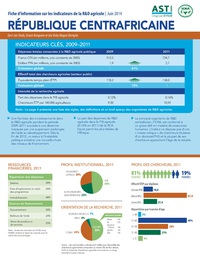Authors:
Stads, Gert-Jan; Obiang Angwe, Paul
Year:
2011
Publisher
International Food Policy Research Institute (IFPRI); and Agricultural and Forestry Research Institute (IRAF)
Back to:
Over the past few decades, Gabon’s agricultural research spending levels have exhibited a highly volatile trend. In 2008, the country invested 406 million CFA francs, or 1.6 million dollars (in PPP 2005 prices), which represents an extremely low level compared with most other African countries. Spending just 0.2 percent of its AgGDP on agricultural R&D, Gabon’s intensity ratio is one of Africa’s lowest. In contrast, the total number of agricultural researchers has been steadily increasing over the past few decades. In 2008, the country’s research capacity totaled 61 FTEs. These indicators bring to light a true paradox: on the one hand, Gabon employs an increasing number of agricultural researchers; on the other hand, the resources needed to carry out the research responsibilities are extremely low and erratic.
Another paradox appears when one considers that—despite its status as one of Africa’s most developed countries—Gabon is of the world’s least developed countries in terms of its agricultural R&D facilities. The agricultural research agencies lack staffing, equipment, programs, and funding. Government grants allocated to the CENAREST institutes are irregular and frequently adjusted downwards as the budgetary year progresses, which leaves the institutes in dire inancial straits. This has led to situations where CENAREST researchers ind themselves underemployed, which negatively impacts their motivation. In addition, Gabonese researchers feel discouraged or disinterested in the face of the rigidity marking the civil service and the obstacles standing in the way of obtaining tenure or permission to travel or study abroad.
Since Gabon is a middle-income country, it is not attributed a high level of priority by foreign donors, whose attention is captured instead by many of its neighbors. The responsibility to endow the country’s research agencies with the tools and funds they need to be fully operational is in the national government’s hands. In order for Gabon’s agriculture to become a prominent sector that will help lead the country towards food sovereignty, the national government will have to increase its level of funding to support agricultural R&D – considerably so, and without further delay.

